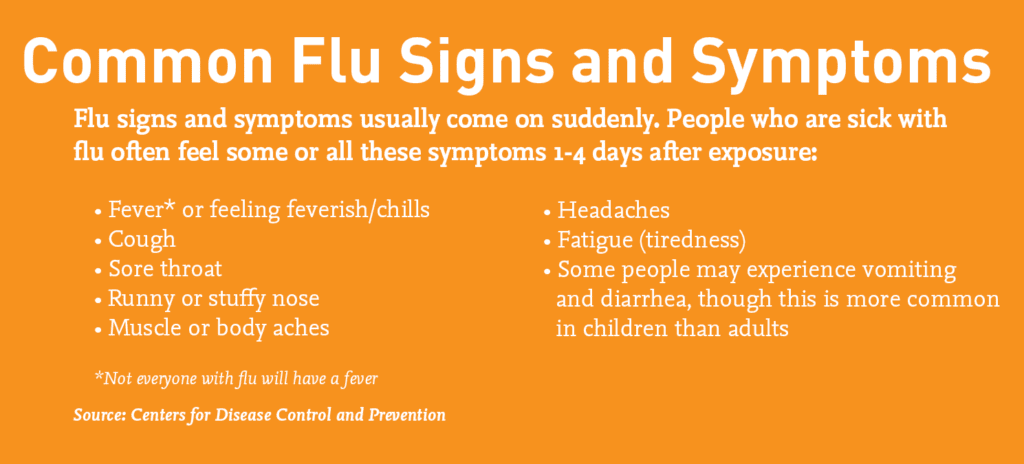Contributors: Dr. Mary Schroth and Dr. Robert Graham
 Influenza (or flu) is a serious respiratory infection, and people of any age can get it. Since 2010, the Centers for Disease Control and Prevention (CDC) estimates that influenza has resulted in between 140,000 and 810,000 hospitalizations each year and 12,000 to 61,000 deaths. There is always uncertainty surrounding how severe the influenza season will be from year-to-year. The severity of the season affects the amount of available healthcare resources, and this year is further complicated by COVID-19. The CDC highlights that, because of the ongoing COVID-19 pandemic, reducing the spread of other viral respiratory illnesses like the flu this fall and winter is more important than ever. Getting the flu vaccine can decrease the number of deaths and complications from influenza, and decrease the complications due to COVID-19 infection. The flu vaccine does not protect against COVID-19, as these are different viruses.
Influenza (or flu) is a serious respiratory infection, and people of any age can get it. Since 2010, the Centers for Disease Control and Prevention (CDC) estimates that influenza has resulted in between 140,000 and 810,000 hospitalizations each year and 12,000 to 61,000 deaths. There is always uncertainty surrounding how severe the influenza season will be from year-to-year. The severity of the season affects the amount of available healthcare resources, and this year is further complicated by COVID-19. The CDC highlights that, because of the ongoing COVID-19 pandemic, reducing the spread of other viral respiratory illnesses like the flu this fall and winter is more important than ever. Getting the flu vaccine can decrease the number of deaths and complications from influenza, and decrease the complications due to COVID-19 infection. The flu vaccine does not protect against COVID-19, as these are different viruses.
Symptoms of influenza and COVID-19 are similar. It is important to identify symptoms of possible influenza or COVID-19 early and contact your healthcare provider at the first sign of symptoms. Influenza may be treated with antiviral medication. The influenza season occurs primarily in the fall and winter, typically peaking between December and February; however, flu activity is seen as late as May. Getting vaccinated for the seasonal influenza is the best way to prevent influenza infection, and the CDC recommends everyone 6 months of age and older receive a flu vaccine every year. Although the flu vaccine will be available throughout the influenza season, to best protect yourself and your family, Cure SMA recommends getting your flu shot by the end of October or early November.

Having SMA can result in more severe influenza infection and complications, due to underlying muscle weakness including respiratory muscle weakness and fatigue, or chronic lung issues related to aspiration. To reduce health complications, ensure individuals with SMA, their caregivers, and close contacts are up to date on their immunizations. General health maintenance is essential for everyone. In the context of COVID-19, all preventative measures matter.
Individuals with SMA should ensure all their immunizations are current. Pneumococcal vaccines, including Prevnar 13 (PCV13) and Pneumovax (PPSV23), should be up to date, especially for older people with SMA. Pneumococcus is a common bacteria that causes infection in the respiratory system, including pneumonia and ear infections. After receiving the first tetanus, pertussis, and diphtheria vaccine, a tetanus booster vaccine should be obtained every 10 years. Additionally, Synagis (palivizumab) is a treatment used to help prevent serious lung disease caused by respiratory syncytial virus (RSV) in high-risk children under the age of 2 years during the viral season.
 Generally, a well-balanced diet will provide the vitamins and minerals your body needs to keep you healthy. Many people are vitamin D deficient especially during the winter months in colder climates. Please discuss whether you may benefit from a Vitamin D supplement with your healthcare provider. Some families and individuals may choose to supplement their diets with naturopathic options, like Vitamin C, echinacea, or elderberry. There is little published evidence of efficacy for these supplements. Be sure to communicate any supplements or medications you are taking with your healthcare team and be wary of anything that seems too good to be true.
Generally, a well-balanced diet will provide the vitamins and minerals your body needs to keep you healthy. Many people are vitamin D deficient especially during the winter months in colder climates. Please discuss whether you may benefit from a Vitamin D supplement with your healthcare provider. Some families and individuals may choose to supplement their diets with naturopathic options, like Vitamin C, echinacea, or elderberry. There is little published evidence of efficacy for these supplements. Be sure to communicate any supplements or medications you are taking with your healthcare team and be wary of anything that seems too good to be true.
If you have any questions regarding this article or recommendation for flu/other vaccination, please reach out to us at [email protected].
COVID-19 Vaccine Precautions
With the potential for a COVID-19 vaccine in the future, all individuals with SMA should take caution before volunteering for vaccine clinical trials. We encourage you to talk with your neurologist about trials and potential interactions with your current treatment protocols.
This consideration is especially important for those considering gene replacement therapy, such as Zolgensma. Some COVID-19 vaccines are using Adeno-Associated Virus (AAV), and Zolgensma uses the AAV9 vector to deliver the SMA gene. Antibodies to AAV can interfere with the effectiveness of AAV-based gene replacement therapies. Additionally, steroids, like those used with Zolgensma treatment, may impact the timing of vaccinations. Vaccines may be delayed while on prednisone, depending on dose and duration. Any new vaccine that contains AAV should be discussed with your healthcare team.


